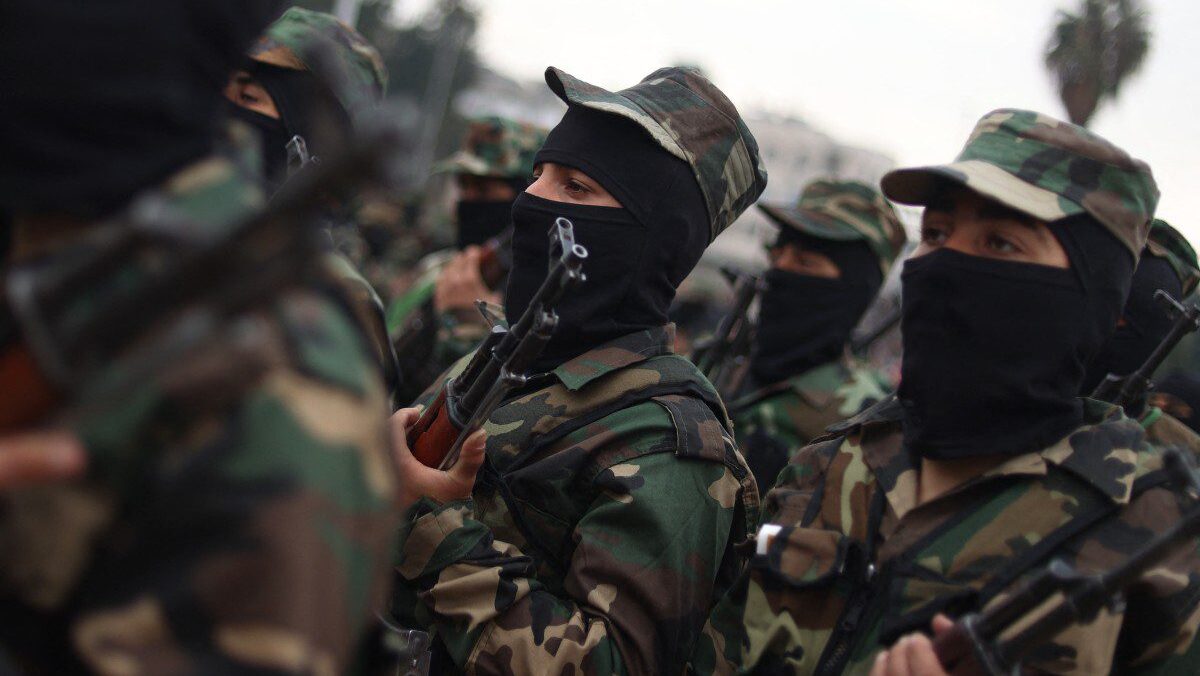
Graduates of Syria’s General Security forces under the country’s new administration attend a ceremony in the northern city of Aleppo on February 12, 2025.
Photo: Aaref WATAD / AFP
The European Union is facing a new internal fracture caused by Greece’s and Cyprus’ firm opposition to end sanctions against the new Islamist regime in Syria, a measure supported by Turkish President Recep Tayyip Erdoğan. This blockade not only highlights concerns about regional stability, but also reflects the ongoing geopolitical struggle between Athens, Nicosia, and Ankara.
Although EU foreign ministers reached a political agreement on January 27th in Brussels to ease sanctions on Syria, Greece and Cyprus have blocked the process by demanding guarantees that sanctions could quickly be reimposed if necessary. According to diplomatic sources, both countries fear that a premature removal of restrictions could consolidate the position of the new Syrian regime and, by extension, strengthen Turkish influence in the region.
The Greek and Cypriot positions go beyond their historical rivalry with Turkey; they also respond to a legitimate concern about stability in the Eastern Mediterranean and the risk that extremist groups linked to Ankara will expand their control in Syria. Their experience in managing massive migration crises leads them to warn that a rushed relaxation of sanctions could trigger a new wave of uncontrolled migration to Europe and strengthen actors who threaten regional security.
During the 2015 migration crisis, when the war in Damascus reached its most violent point with clashes between the Syrian regime, insurgents, and the Islamic State, the EU reached an agreement with Turkey to manage the refugee flow. In exchange for taking in millions of displaced people, Ankara received €3 billion. Since then, Erdoğan has used this pact as a pressure tool against Europe, repeatedly threatening to open the borders.
The EU, led by foreign policy chief Kaja Kallas, has expressed its intention to suspend sanctions in key sectors such as energy, transport, and finance, arguing that this would contribute to the “stabilization” of the country after Assad’s fall. However, Greece and Cyprus argue that this will only benefit Turkey, facilitating its economic and political expansion in Syria and consolidating it as a regional power.
In a recent interview, Ribal al-Assad, cousin of former leader Bashar al-Assad and founder of the Organisation for Democracy and Freedom in Syria (ODFS), has been clear in his criticism of this measure:
Honestly, I am surprised. Many are rushing to lift sanctions on the Syrian regime, arguing that they could be reinstated if violence resurges. However, these atrocities continue. Daily massacres are being committed.
Al-Assad also warns that Syria could become a “sanctuary of extremism at Europe’s doorstep” if the international community does not act firmly.
In response to this situation, Cyprus, Greece, and Austria presented a series of proposals during the EU Foreign Affairs Council on December 16th to address the Syrian crisis in a structured manner. These include appointing an EU special envoy for Syria, creating a European support mechanism for the country’s reconstruction, and using frozen assets of the Assad regime to pay for humanitarian and reconstruction projects.
The goal of these initiatives is to make any European support conditional on a real political transition, based on respect for Syria’s territorial integrity and ethno-religious diversity. Additionally, they insist on the need for constant monitoring to prevent aid from unintentionally benefiting extremist groups or the Turkish government. Ribal al-Assad emphasizes the risk of legitimizing extremist actors in Syria’s new landscape:
How can we negotiate with jihadists? The European Union has never met with leaders of Hamas, Hezbollah, or Al-Qaeda. So why recognize a group whose leader was a deputy commander of ISIS?
The document presented by Cyprus, Greece, and Austria also warns of the risks of Syria’s fragmentation and the rise of extremist groups, including the reemergence of the Islamic State and the influence of the Muslim Brotherhood in shaping the new regime. Additionally, it highlights concerns about drug trafficking, particularly the production and distribution of Captagon, a drug crucial to the financing of armed groups in the region.
Greece and Cyprus insist that any EU decision must be accompanied by a clear and sustainable strategy that guarantees not only immediate stability but also a secure future for Syria, free from the Islamist threat. The final decision on lifting sanctions will not only determine the fate of the Arab country but also the balance of power in the Eastern Mediterranean and Turkey’s role in European politics.
